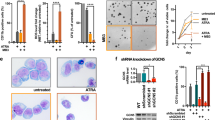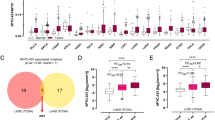Abstract
The p21MDA6 gene product induces cell cycle arrest in p53-null human leukemic cells exposed to differentiation stimuli. We employed an HL-60 cell line stably transfected with a p21MDA6 antisense construct to compare the effects of p21MDA6 dysregulation on the response of myeloid leukemia cells to differentiating and cytotoxic agents. Antisense-expressing cells (HL-60/AS5) treated with 5 n M PMA for 24 h exhibited attenuated induction of p21MDA6 compared to empty vector controls (HL-60/V2). This phenomenon was accompanied by a reduction in the percentage of cells undergoing G1 arrest (67.6 ± 4.7 vs 82.9 ± 1.3; P ⩽ 0.01) and expressing the monocytic maturation marker cd11b (35.5 ± 2.8 vs 50.5 ± 2.4; P ⩽ 0.005). Although HL-AS5 and HL-60/V2 cells did not exhibit obvious differences in the phosphorylation status of the retinoblastoma protein (pRB), in E2F complex formation, or in p27kip1 induction following PMA exposure, inhibition of activity of cyclin-dependent kinase-2 was attenuated in the antisense-expressing line. A 24-h exposure to 5nM PMA also reduced the cloning efficiency of HL-60/V2 cells to a significantly greater extent than HL-60/AS5 cells (ie to 30.1 ± 7.0 vs 57.2 ± 5.6 of controls; P ⩽ 0.01). In contrast to the disparate responses to PMA, HL-60/AS5 and HL-60/V2 cells treated with the antimetabolite 1-β- D-arabinofuranosylcytosine (Ara-C; 10 μ M for 6 h) displayed equal susceptibility to G1 arrest, apoptosis, and inhibition of clonogenicity, phenomena unaccompanied by p21MDA6 and p27kip1 induction, or pRB dephosphorylation. These observations indicate that dysregulation of p21MDA6 in p53-null human myeloid leukemia cells interferes with PMA-related G1 arrest, CDK-2 inhibition, differentiation, and loss of clonogenic survival in the absence of obvious alterations in pRB phosphorylation status or E2F complex formation. They also provide functional evidence that p21MDA6 induction does not appear to be required for Ara-C-induced apoptosis, G1 arrest, or the resulting reduction in the self-renewal capacity of HL-60 cells.
This is a preview of subscription content, access via your institution
Access options
Subscribe to this journal
Receive 12 print issues and online access
$259.00 per year
only $21.58 per issue
Buy this article
- Purchase on Springer Link
- Instant access to full article PDF
Prices may be subject to local taxes which are calculated during checkout
Similar content being viewed by others
Author information
Authors and Affiliations
Rights and permissions
About this article
Cite this article
Freemerman, A., Vrana, J., Tombes, R. et al. Effects of antisense p21 (WAF1/CIP1/MDA6) expression on the induction of differentiation and drug-mediated apoptosis in human myeloid leukemia cells (HL-60). Leukemia 11, 504–513 (1997). https://doi.org/10.1038/sj.leu.2400625
Received:
Accepted:
Issue Date:
DOI: https://doi.org/10.1038/sj.leu.2400625
Keywords
This article is cited by
-
Multiple functions of p21 in cancer radiotherapy
Journal of Cancer Research and Clinical Oncology (2021)
-
MDA-9/Syntenin/SDCBP: new insights into a unique multifunctional scaffold protein
Cancer and Metastasis Reviews (2020)
-
Diallyl trisulfide-induced G2–M phase cell cycle arrest in human prostate cancer cells is caused by reactive oxygen species-dependent destruction and hyperphosphorylation of Cdc25C
Oncogene (2005)
-
Cell cycle regulators and hematopoiesis
Oncogene (2002)
-
Synergistic induction of mitochondrial damage and apoptosis in human leukemia cells by flavopiridol and the histone deacetylase inhibitor suberoylanilide hydroxamic acid (SAHA)
Leukemia (2002)



